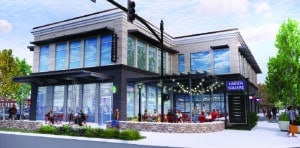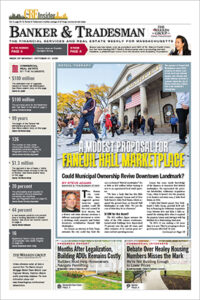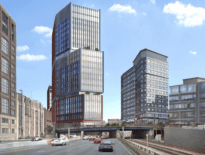
Federal Realty Investment Trust has expanded its pop-up offerings at its properties including Somerville’s Assembly Row and Wellesley’s Linden Square (pictured). Image courtesy of Federal Realty
Pop-ups and temporary leases in general are more popular than ever in a post-COVID environment.
With the pandemic slowly receding, retailers and others who seek to connect with consumers are anxious to return, but understandably wary for a number of reasons: fear of long-term commitment (even for established national brands); concerns about risk and loss from a lockdown or other uncontrollable event; lack of available resources and an enormous desire for flexibility/ability to be nimble and adjust not only location, but mode of delivery (takeout versus in-restaurant dining, curbside pick-up versus leisurely indoor shopping).
While a lot has changed on the retail landscape in the last year, at the same time nothing has changed. For thousands of years, people have manufactured goods, merchants bring them to the marketplace and consumers buy the wares. Good products are always needed and wanted by a willing consumer.
Convenience Still Rules
Merchants and consumers adapted to curbside pickup, takeout of fine food and luxury items and limited store capacities throughout 2020, but sales have gone on. And the biggest changes of all have been in shopping center settings. Customers still appreciate not having to go to a number of different locations to complete their tasks, but prefer less indoor time which benefits outdoor lifestyle destinations and strip shopping centers most.
From outdoor entertainment such as parking lot drive-in movies, to easy curbside pickup, to “buy online, pick up in store” (BOPUS), convenience still rules and new retailers will always benefit from locating near successful peers and taking advantage of their existing customer base.
Many of the safety, health and regulation concerns may well be temporary, but one thing is certain: merchants are more thoughtful and slower to locate with regard to location and what is around them. Retailers generally have a much smaller risk tolerance – many now just can’t stomach long-term leases and onerous commitments after the losses of the pandemic.
Pop-ups Offer Benefits to Both Parties
Pop-up retail – from three days to 12 months – has been growing for a couple of years but has never been stronger based on merchants wanting to be able to test if their product and concept is going to work. Even large national merchants are trying out spaces and centers on a shorter-term basis.
What makes a merchant want to test a space or do a pop-up with a specific property? Easy access to entry, simple license agreements and terms and flexibility in the deal including rent. Why should landlords want to do these shorter deals? Incubate long-term relationships at the outset of a business, fill spaces that otherwise might remain vacant and most of all, surprise and delight shoppers with new energy and rotating experiences.
Many property owners, including our team at Federal Realty, recognize this mutual benefit and have worked to expand our reach to varied merchants, and most importantly worked to make the process easy, simple and fast. Streamlined contracts, less stringent credit requirements and shorter-term leases all welcome new businesses and those trying to recover and/or pivot towards success in this new environment.

Mike Kelleher
For example, a terrific Connecticut-based beauty concept called Pink Soda has recently popped up in Federal Realty’s Linden Square destination center in Wellesley. Alongside essential retail such as Roche Bros. and CVS, the business owner can expose her concept to reliable existing traffic in a brand-new market. So far, her reception has been solid and Pink Soda is gaining important recognition with her target market without huge buildout costs and long-term lease restrictions. With this type of test, if the customer base is proven, each party aims to convert to a permanent lease.
Pop-up is here to stay in a stronger and more meaningful way which is very positive for landlords, merchants and consumers. Again, pop-ups are not new but are now more relevant and attractive for all. Those that adapt the quickest will benefit in whatever the new normal it is exciting for all.
Mike Kelleher is vice president of ancillary revenue at Federal Realty Investment Trust.





